In this article, we set out to answer these key questions:
- What is a blockchain?
- What are NFTs?
- What are the advantages of using blockchain and NFTs for ticketing?
- Which events can benefit the most?
- What are the opportunities and challenges?
We’re answering your most burning questions on using blockchain and NFTs in ticketing for events and listing the leading vendors operating in this space.
What Is a Blockchain and What Are NFTs?
First things first. What is blockchain? What is an NFT?
Blockchain is a complex concept, so it’s best to focus on the most relevant ticketing.
A blockchain is a database. In regular databases, there is one computer that holds a master copy of the data. In a blockchain, the database is shared across multiple computers interconnected in a network. Thus, various computers hold identical copies of data in a distributed way. Most blockchain systems are also decentralized, meaning that there is not one central entity with control and decision-making power.
Blockchains are best known for powering cryptocurrency (including Bitcoin and Etherium), but there are also blockchains in use in banking, healthcare, and many other industries.
NFT stands for Non-Fungible Token, and these are unique digital tokens that store information on a blockchain. Unlike cryptocurrencies which are mutually interchangeable (fungible), NFTs cannot be interchanged. NFTs can be used to represent physical items, people’s identities, or properties. As all NFTs are entirely different from all others, thus they are ideal for uses such as ticketing.
For more information on how blockchains and NFTs work, we recommend this and this page on Investopedia, respectively, and this graphic by Reuters.
What are the advantages of using blockchain and NFTs for ticketing?
The main advantage of using blockchain and NFTs for ticketing is that it enables event organizers to keep track of the tickets after they are sold. All tickets are securely linked to the purchaser, and these transactions and any others on the exact tickets are entered in the blockchain. Any further sale or transaction involving the tickets will also be listed in the blockchain. Keeping a shared database of all the transactions involving each ticket limits or even eliminates the possibility of scalping, uncontrolled price gouging, and fraudulent transactions.
There are other advantages to controlling the transactions through blockchain, including ensuring that ticket prices are kept fair, even when resold, and the opportunity to award royalty payments for each transaction to artists or event organizers.
NFTs build on these advantages by also potentially providing additional revenue streams in the form of transaction fees for used tickets as collectibles. NFTs can be produced quickly at low cost, which is not necessarily true of other uses of blockchains.
Which events can benefit the most?
Blockchains are constantly evolving, and they have the potential to be part of ticketing and registration for all events. Currently, the advantages of using blockchain and NFTs are more relevant to some types of events.
Consider the following criteria to see if blockchain ticketing is a good fit for your event:
- The event is in high demand
- The event has a strong potential for ticket resale
- You want to control who can to re-sell tickets
- There is an active community of fans around your event
These criteria reflect that security and control are the most significant advantages for event professionals. They also reflect that music and sporting events can benefit from blockchain ticketing as ticket scalping and unregulated secondary markets are widespread issues.
Business events are not commonly plagued by issues like ticket scalping and unregulated secondary markets, so it’s easy to dismiss using blockchain technology for them.
Not so fast.
Blockchain and NFT technology offers immediate benefits to larger-scale events public with control issues, yet security is an area of increasing concern to event professionals. Tightly controlling access to business events has never been as crucial as now, with in-person taking place in many parts of the world under strict safety regulations.
It’s relatively easy to forge registrations or get access to discarded name badges. There is also commonly limited care in terms of identifying each participant entering business events. Ticketing and registration platforms offer varying identity checking and security features, but matching the ticket to the participant’s identity on-site is not always guaranteed.
While the issue confirming the identity of those attending business events may not be perceived as high risk, the impact of the wrong people accessing an event can be catastrophic. From sexual harassment to active shooter occurrences, blockchain-powered ticketing could give potential intelligence to avoid unwanted individuals gaining access. It’s important to note that blockchain and NFT technology are not the only way to do this; however, these technologies have security and control at their core.
What are the opportunities and challenges?
In this section, we asked subject matter expert Eric Rozenberg on what he sees as the opportunities and challenges of blockchain for ticketing.

Eric Rozenberg, CMM, CMP, HOEM, FONSAT
Founder and CEO of Event Business Formula
Eric is an entrepreneur, coach, speaker, bestselling author, and the host of “The Business of Meetings” podcast. He has helped thousands of business owners grow and manage their business better.
OPPORTUNITIES
Blockchain solves many of the main issues faced by venues and organizers: security, fighting the bots, eliminating scalpers, increasing targeted marketing. As it is a “smart contract”, blockchain allows the organizer to set the price and the conditions based on which the ticket can be transferred or resold … which could be beneficial for the true fans.
CHALLENGES
The only past limitation could have been the scalability/cost, especially for small numbers of tickets. Post-pandemic, everyone now wants mobile delivery of their tickets, and enhancing it by injecting tickets into the blockchain is an affordable solution.
Blockchain Ticketing Providers
If you are convinced that blockchain is for your event, this next section gives you an overview of all the existing blockchain technology providers to sell tickets for your events.
Here they are listed alphabetically:
B.A.M
B.A.M Ticketing is an Austrian company that provides tamper-proof ticketing for live events secured by blockchain technology. B.A.M’s Ticketing as a Service (TaaS) can be subscribed to on a pay-per-use basis and integrates with any existing ticketing system so event organizers do not have to change their systems.
The company claims to outperform any other blockchain framework and meets current and future ticketing business requirements unlike common distributed ledger or blockchain systems (e.g. Bitcoin, Ethereum, EOS). It offers high transaction rates of 650 transactions per second and a fast response time of 0.8 seconds on the B.A.M core network which is available in more than 35 regions. It offers ticketing companies, organizers, and venues the hosting of their own nodes onsite to increase availability, further reduce latency and keep their transaction data private.
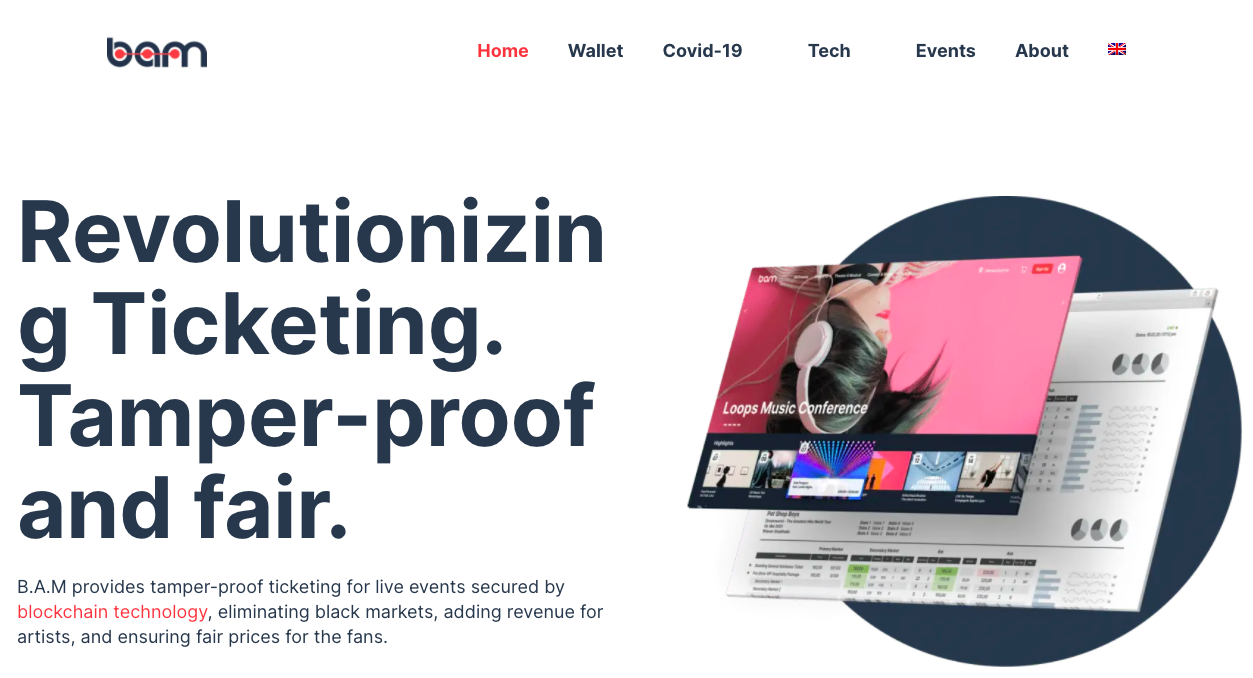
Blocktix
The Blocktix platform is a direct link to an active community of people incentivized to engage with local events in their community. Its system is used to create awareness about events, ticket distribution, ticket transfer, and event promotion with a single system that provides all these services with a low overhead for distributors and promoters.
Blocktix provides event promoters with a ticket exchange that enables complete control of primary and secondary market ticket distribution. For the first time, promoters are able to create rules for each ticket sold which include setting up passthrough percent,ages for the artists and promoters themselves.
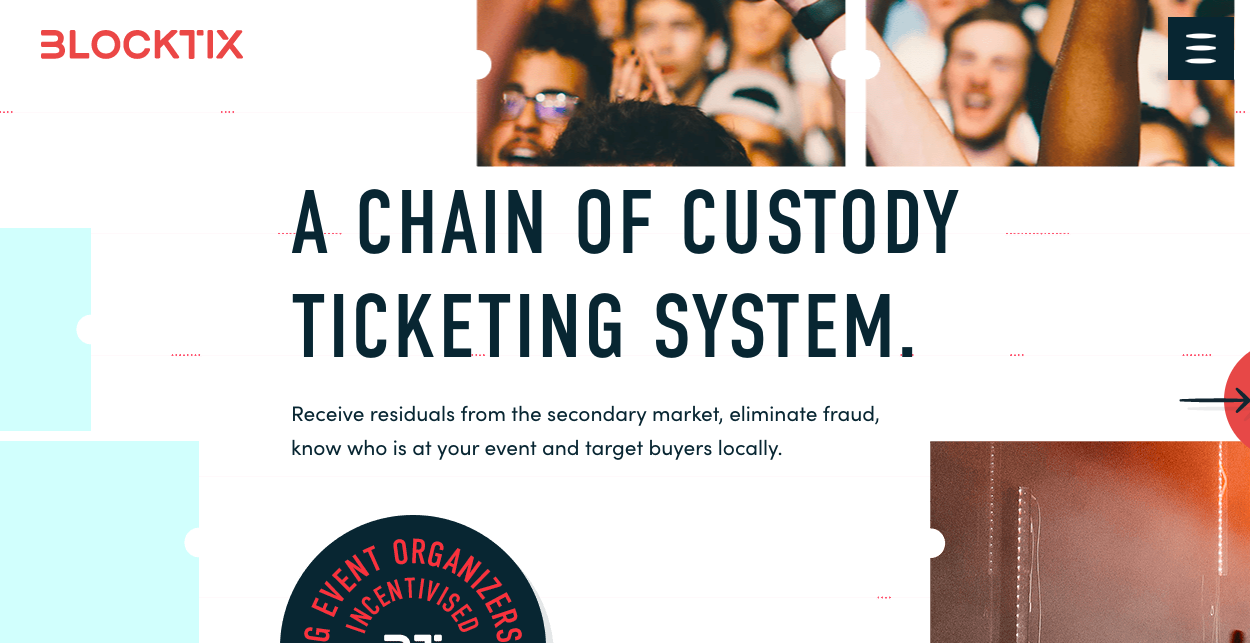
ComeTogether
ComeTogether’s promise is to give control of the entire ticket lifecycle to event organizers, with the power of blockchain. The ComeTogether Network provides an infrastructure for event ticketing, fraud elimination and secondary market revenue management.
An EOSIO blockchain ticketing engine controls the entire lifecycle of a ticket. The use of smart contracts provides functionality for issuing, selling and validating tickets, as well as setting rules for resales. Blockchain ensures security from hackers and system failures to keep customer data confidential and digital tickets available at all times, even after the event, as a digital collectible.
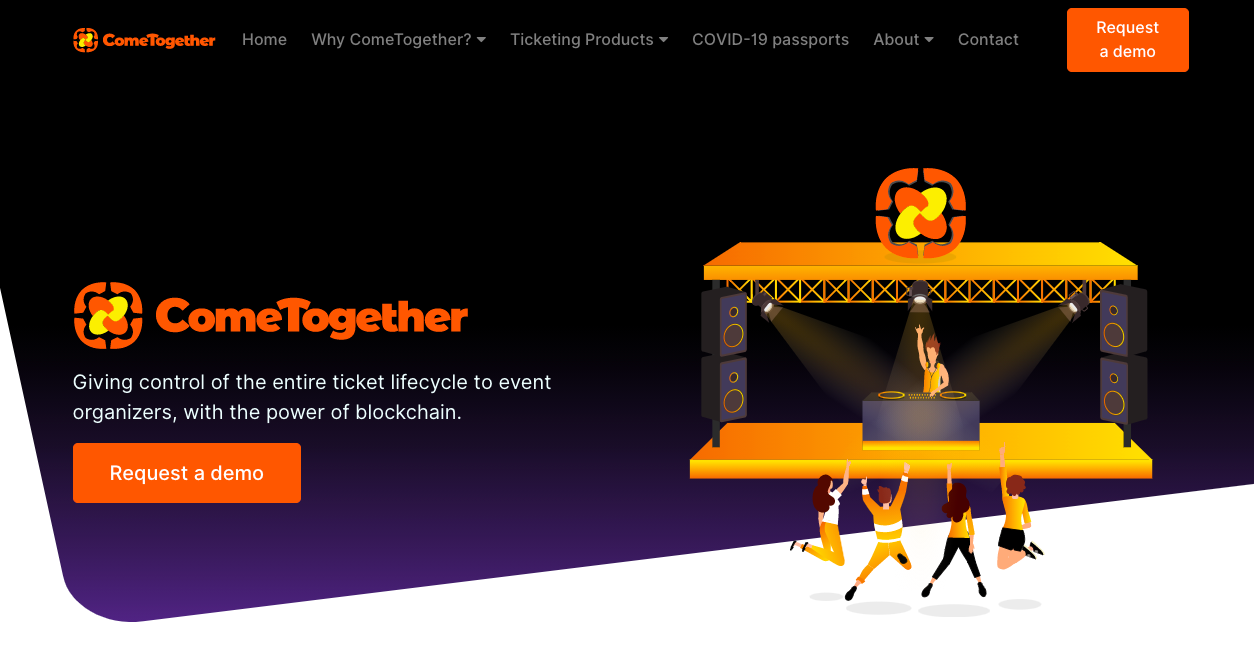
Crypto.Tickets
The platform is based on blockchain technology using a transparent decentralized system for selling tickets, open for event organizers and existing ticket systems to join. The Crypto.Tickets ecosystem integrates all possible business-related aspects while optimizing time sequences and money. It provides the audiences with what the company claims is the smartest event admission technology available.
Crypto.Tickets offer a valuable possibility of controlling the entire lifecycle of tickets, their pricing, and the data that is collected. The blockchain technology embedded in the platform resists even the most sophisticated scalpers. The smart tickets come with a dynamic code that cannot be copied or hacked and, as such, offers complete trust to the audience, even when the tickets are being bought on the secondary market and, inherently, increase sales. The company has its own Ticketswallet which can be white-labeled and offers the option of using external wallets via an API.

EventX
EventX is a payments, access, and intelligence platform that features Blockchain ticketing (NFT) and access control with age check and visitor registration. Blockchain technology is used to ensure a secure, fast, transparent, and immutable system for payments, ticketing, and access control. EventX is built on blockchain and open source technology making it possible to run the full solution off-the-grid for days without the need for internet.
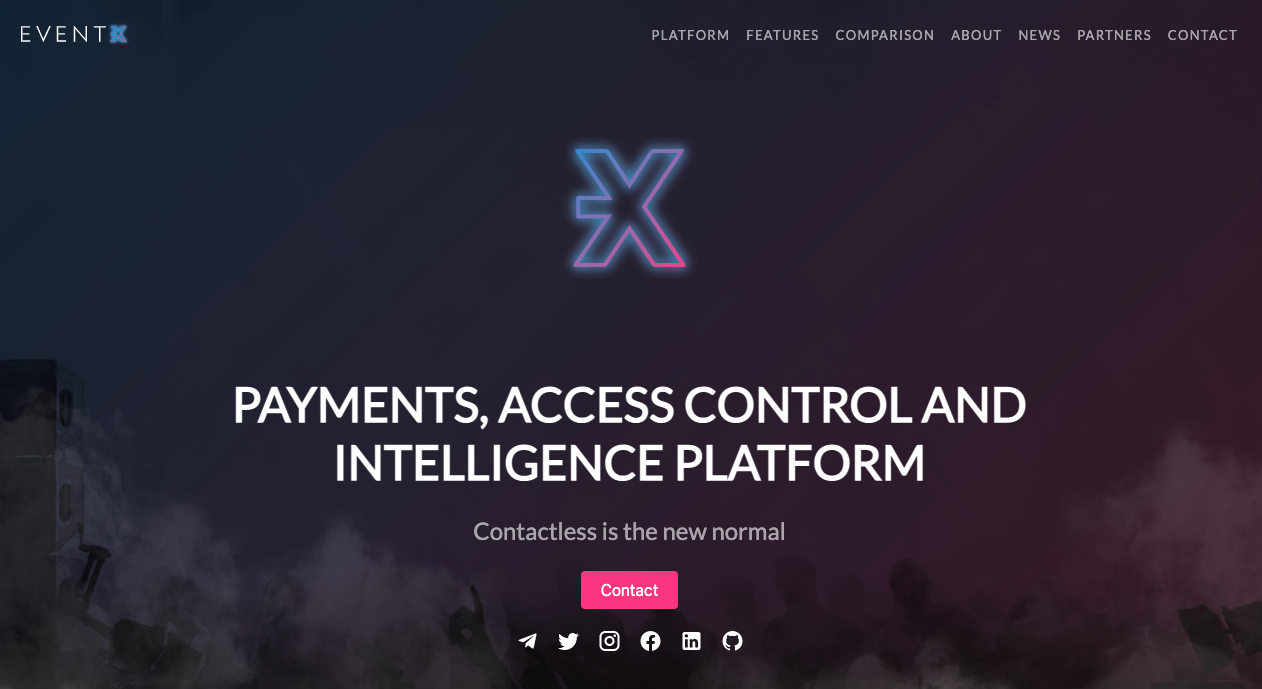
FanDragon
FanDragon, the technology behind the TixTo.Me service used by LiveNation France, is an innovative SaaS tool, powered by the Aventus Blockchain Protocol, that provides easy and secure mobile delivery for everyone in the ticketing ecosystem. The company offers ticket delivery support into existing apps, using Secure Ticket Sync™ and Secure Ticket Transfer™ to ensure ticket authenticity throughout the event lifecycle.
Once a customer purchases a ticket, FanDragon’s modular system delivers the ticket seamlessly to a single mobile device, locking it securely to the buyer using a secure ticket wallet. Customers have complete visibility into every ticket throughout its entire lifecycle – activated, transferred, and redeemed at the venue. The system also allows for fan engagement via FanDragon’s message center that allows you to communicate directly with ticket holders – before, during, and after the event.
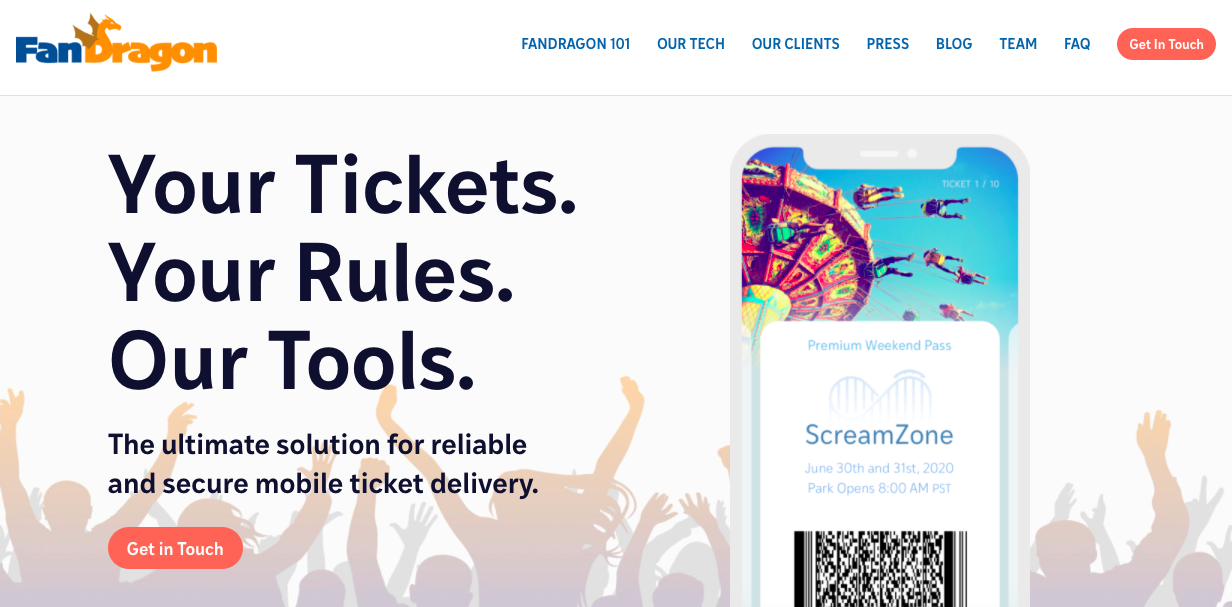
GUTS Tickets
GUTS uses blockchain technology to issue honest tickets that put an end to disgraceful secondary market prices and ticket fraud. GUTS’s digital tickets come with countless innovative benefits for fans and organizers that you won’t get anywhere else.
The company developed a technical solution called ‘GET Protocol’; a smart-ticketing solution that forms the backbone of their system and can instantly be used by any ticketing company in the world to make their tickets honest and transparent. The company promises that using their system and the underlying protocol will eradicate scalping on a commercial scale.
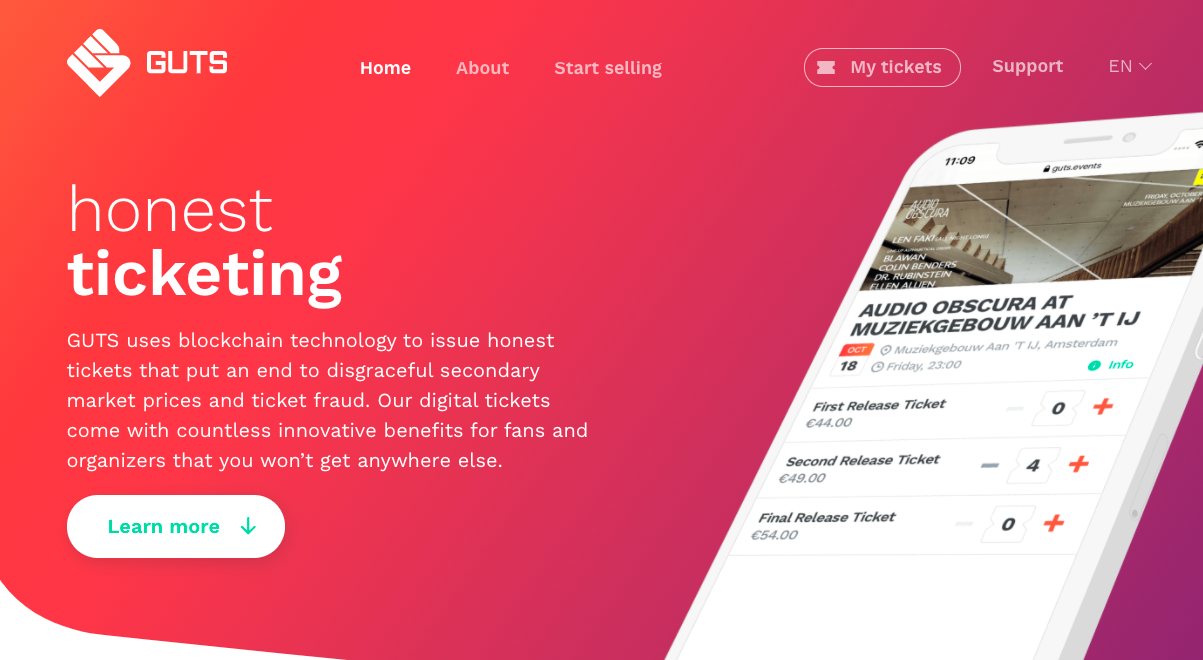
PassageX
PassageX’s promise is to fix event ticketing with the blockchain. As the first secondary ticket network to eliminate fraudulent tickets, PassageX allows consumers to check the validity of any ticket – online or in-person – in real time. It uses a combination of private and public blockchain technology, and this combination strengthens the PassageX Network and makes it transparent and open to use for every secondary ticket sale.
This allows venues, artists, and producers to benefit from every sale and not simply the primary ticket sales. PassageX allows for unlimited (required) service fee splits, and their Network offers a multi-tiered solution to eliminate fraud.
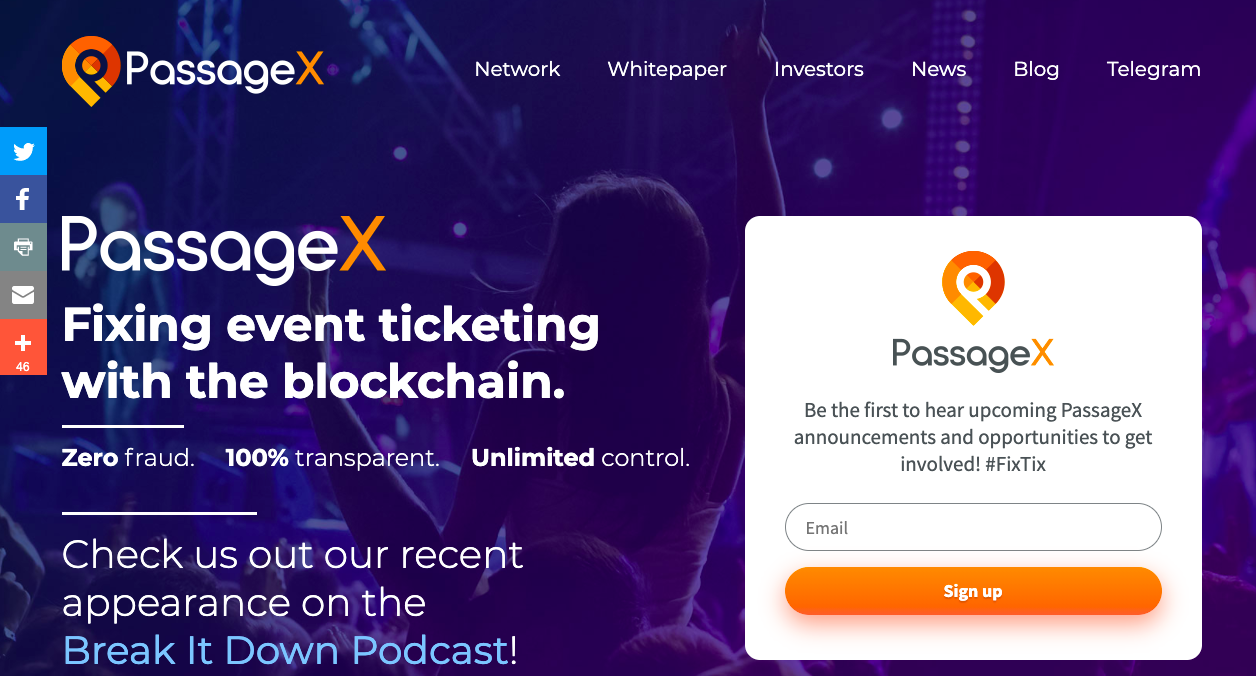
TicketHash
TicketHash is a platform focused on what the company calls the digitization of events. The system includes modules for Smart Ticketing, Smart Voting, Fan Engagement, Digital Collectibles and innovative payment options. The platform combines the security and transparency of a blockchain solution with the scalability and compliance of an enterprise application.
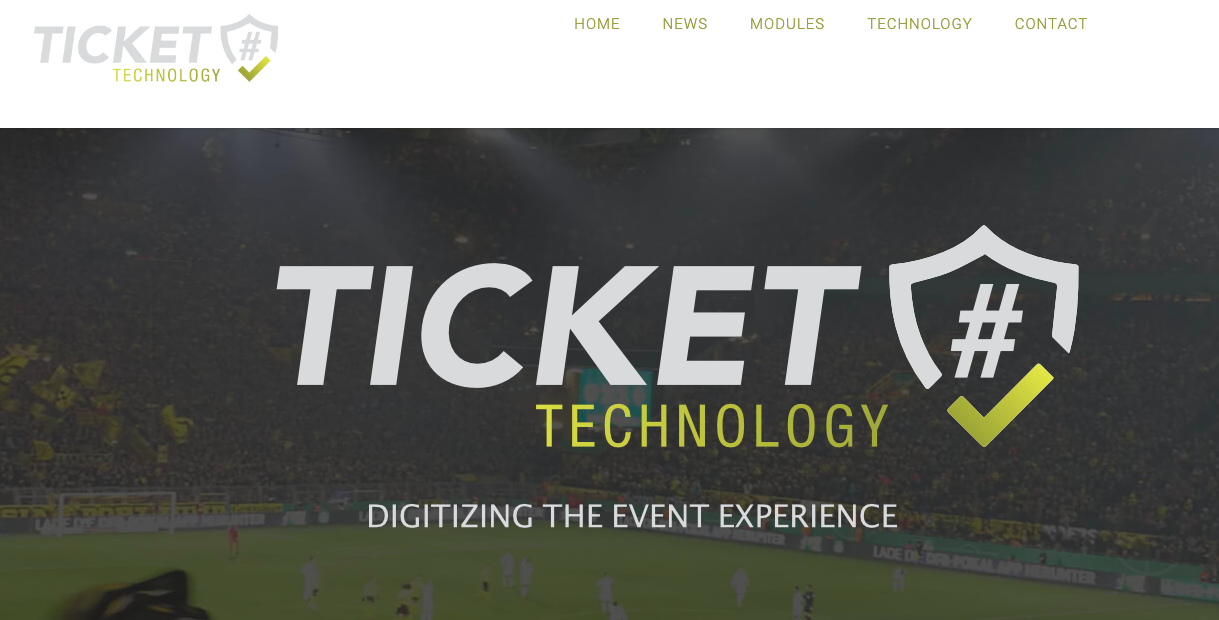
TIXnGO
TIXnGO is a secure mobile ticket wallet that promises to eliminate fraud, boost agile operations and security, uplift your data and take the fan experience to the next level. TIXnGO is the sister company to cloud-based ticketing solution SecuTix.
The mobile application is an enhanced wallet where spectators can securely store, transfer, sell, resell or buy digital tickets. The API layer abstracts the blockchain and AI core engines. It provides functionalities on top of it, such as ticket creation/deletion, data privacy, an integrated payment system, identity verification and resell price regulation. The blockchain guarantees security, transparency, immutability and removes the need of a trusted third party.
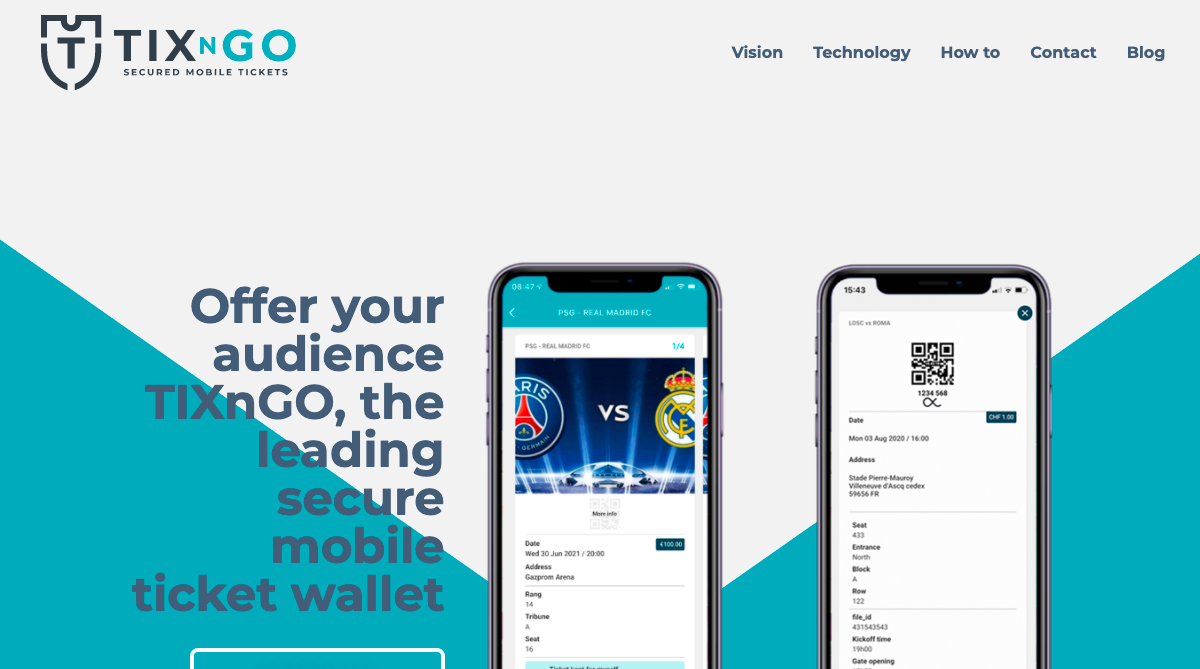
True Tickets
True Tickets (enabled by IBM Blockchain) provide a contactless digital ticketing delivery experience that’s both scalable and secure while integrating with existing ticketing platforms and CRM’s—Making buying, selling, and transferring entertainment tickets simple and safe.
True Tickets is a client-first start-up keenly focused on providing digital customizable rights management for contactless digital tickets to the ticketing issuer. The company works with venues and platform partners as a turn-key solution that works with existing systems to provide a lasting business solution for both primary and secondary ticket markets.
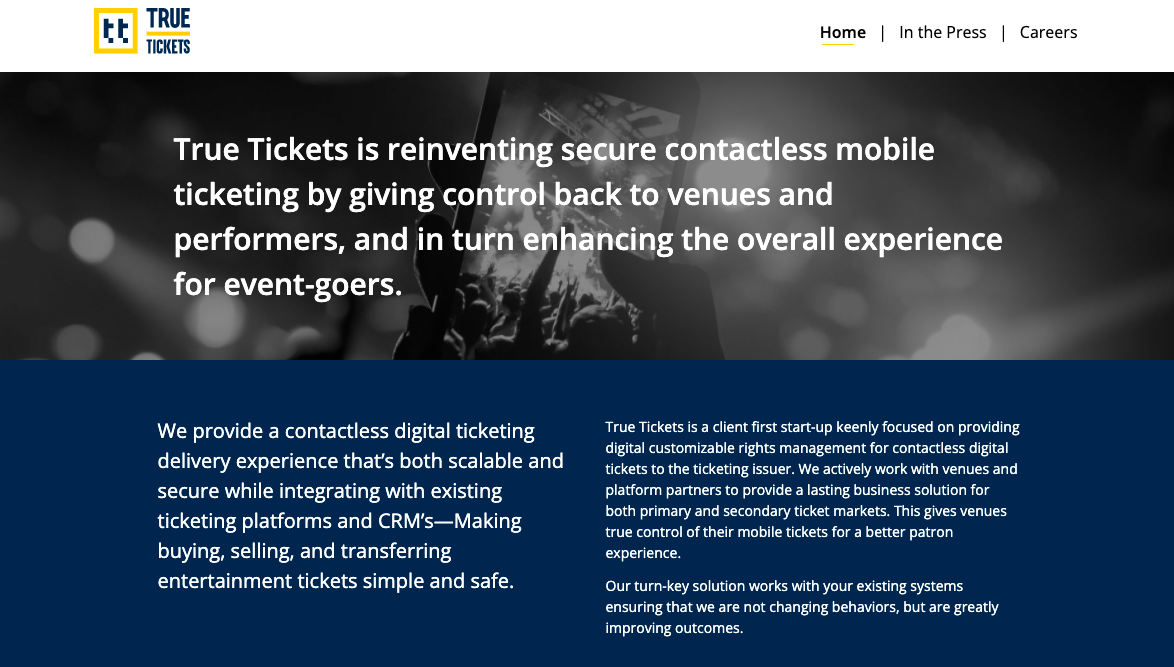
YellowHeart
YellowHeart’s promise is to empower artists and fans with full ticketing transparency. Better known as an NFT marketplace, the company, which is owned by Ticketmaster offers ticketing solutions beyond their own marketplace.
Interestingly part of the advantages featured on their product page is for fans to be able to finally understand the price composition of a ticket. For organizers, it lists the ability to verify fan identities as well as dictate ticket transaction revenue participants.
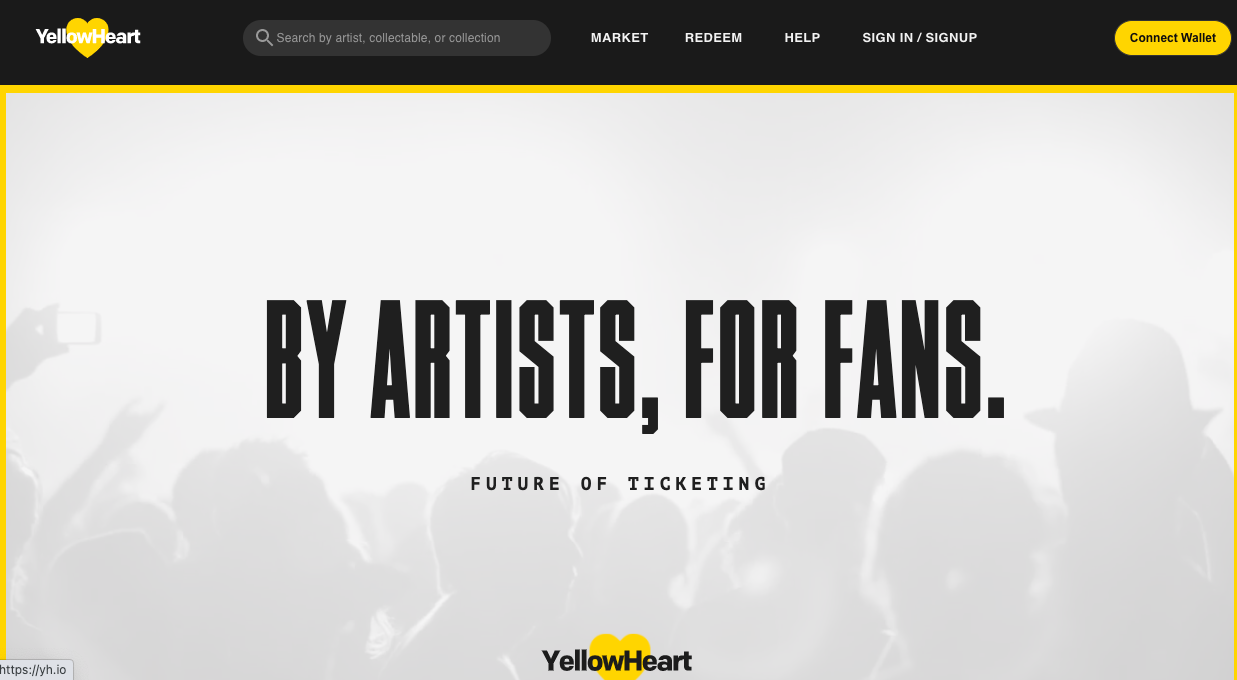
IN CONCLUSION
Blockchain is a promising technology that has obvious benefits for seasoned event professionals looking to secure their events.
The benefits of blockchain for ticketing are substantial if:
- Your event has a problem with the secondary market
- Your event is in high demand
- You want to secure who access the tickets
- You want to offer ticket reselling capabilities only to trusted individuals or organizations
The high number of startups and established players in the event ticketing industry embracing blockchain is a clear indication that this technology is valuable.
Blockchain is set to create a new wave of services for the event industry and we are just witnessing the first iterations of the technology. Watch this space!





